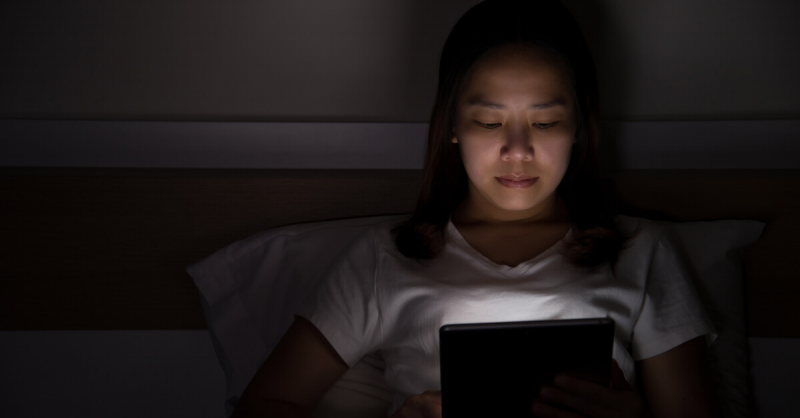
Into the evening, you find yourself perusing social media on your phone or another mobile device. As it gets later, you slink away to go to bed. In bed, you toss and turn. It feels like you’re unable to fully turn off your brain. This is particularly odd because there aren’t any stress-inducing ideas on your mind. It just feels like your brain is stuck in drive and won’t let you sleep. What gives?! What you’re experiencing very well may be the effects of blue light on your brain.
“What exactly is blue light?”
In itself, there’s nothing wrong with blue light. The blueish hue in some forms of light, seen or unseen, is actually quite beneficial for many things. Blue light is simply a color of light that exists in the natural world. It exists in daylight as well as a variety of daylight-emulating light bulbs. In addition these sources, blue light also emanates from many digital display screens. These screens can range from televisions to tablets and personal mobile devices.
“Why is blue light bad for sleep?”
You may notice that using a phone, tablet, or television for extended periods before bed increases the amount of time it takes you to fall asleep. This is mostly due to your circadian rhythms being miscalculated by the blue light from these screens. Your circadian rhythm is basically your internal clock. Within this clock is a schedule that tells your mind when are the best times to be the most alert and what times are best for rest. These schedules depend on a variety of factors to be able to decide when it’s best for the body to be alert and when it can take it easy. One of those factors is blue light. Because blue light is present in natural daylight, your mind naturally associates blue light with being alert. Only up until recently in our evolutionary history have we had sources of artificial blue light after the sun has set. When we expose our eyes to blue light for extended periods of time later in the evening, we’re basically fooling our circadian rhythm into thinking that it is still day and that we should remain alert.
“How do I avoid blue light before bed?”
Fortunately for you, most of the color temperatures in leisurely parts of the home tend to be warmer tones to promote relaxation. Electronic screens, however — whether in the form of TVs, tablets, or phones — emit a tremendous amount of blue light. There are ways to avoid this blue light, though.
- Make it a habit of avoiding screens 2-3 hours before bed. Opt for that book you’ve been meaning to get to instead.
- If you absolutely can’t stay away, look for a Night Mode for your devices. This will remove the blue light from the picture, resulting in a slightly yellow look. You can even set these to turn on and off automatically every night.
- Purchase some blue-light blocking glasses. These are relatively inexpensive and even in your prescription.
For additional help setting the appropriate circadian mood in your house, see our LED Light Color Guide for your home. If you’re looking for customizable, efficient lighting for your home or business, look no further than the LED professionals at Lighting, Inc.

